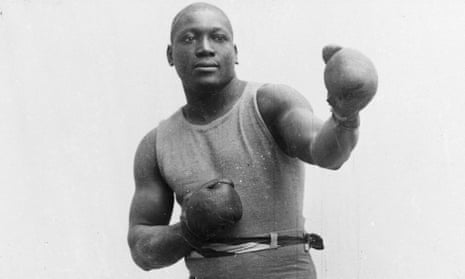Donald Trump said on Saturday he is “considering a full pardon” for Jack Johnson, the great African American boxer who was a victim of racially motivated injustice.
Johnson became the first black heavyweight world champion in 1908, winning a fight in Australia against a white boxer from Canada. In July 1910 he pummelled the white boxer Jim Jefferies in Reno, Nevada, a famous a victory that led to deadly race riots.
In 1913 Johnson was charged under the Mann Act with transporting a prostitute across state lines. Contemplating the all-white jury, the boxer told his lawyer: “Eleven of those men are for life conviction, and the other is for hanging before hearing the evidence.”
Duly convicted, Johnson said: “They crucified Christ, why not me?” He then skipped bail and went to Europe. In 1920, he returned to the US and served nearly a year in jail.
Johnson died in a car crash in North Carolina in 1946, at the age of 68. He has been widely celebrated since, inspiring a seminal jazz rock album by Miles Davis and books and films including a 2004 documentary by Ken Burns, Unforgivable Blackness: the Rise and Fall of Jack Johnson.
Since the turn of the century, a campaign for a posthumous pardon has gathered pace. George W Bush and Barack Obama, the first black president, did not act on the matter but the Arizona senator and 2008 Republican presidential nominee John McCain has supported legislation for a pardon. Harry Reid, the former Democratic Senate leader from Nevada who was a boxer in his youth, is also a supporter.
In 2010, the British world heavyweight champion Lennox Lewis told the Guardian that though Muhammad Ali’s “contribution was profound, Jack Johnson’s was the first”.
“It was quite a story,” Lewis said. “I am a lover of history and it was good to look again at the sort of attitudes that were about back in those days, to see how far we have come.
“Even though black people were, in some ways, more accepted in American culture, the promoters’ dream became to look for controversy. And Jack Johnson was the first great showman. He gave them what they wanted. Look at the time he lived.
“It was remarkable that he was travelling the world, as a black man, getting arrested, leaving America, going to Europe. In the end he got old, like we all do, and he got knocked out by Jess Willard.”
On Saturday, Trump tweeted that he had just learned about Johnson from an actor famous for playing a fictional – white – boxer.
“Sylvester Stallone called me with the story of heavyweight boxing champion Jack Johnson,” Trump tweeted from Florida, where he watched the Houston funeral of former first lady Barbara Bush on television, his wife Melania attending in his stead.
Stallone, the star of the Rocky movies, has been a guest at the president’s Mar-a-Lago resort.
“[Johnson’s] trials and tribulations were great,” Trump added, “his life complex and controversial. Others have looked at this over the years, most thought it would be done, but yes, I am considering a Full Pardon!”
Trump has used his pardoning power three times: for the controversial Arizona sheriff Joe Arpaio, who was convicted of racially profiling Latinos; for Kristian Saucier, a sailor convicted of taking photos in a restricted area of a submarine; and earlier this month for I Lewis “Scooter” Libby, a Bush aide convicted of leaking the name of a CIA agent.
Last month, reports that the president’s lawyers discussed the pardoning power in the context of the Mueller investigation into Russian election interference and alleged links between Trump aides and Moscow caused general consternation.
